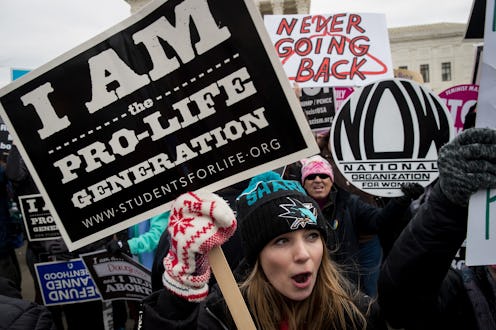News
Defunding Planned Parenthood Hurts Pro-Life Women, Too

After lambasting Obamcare for the past seven years, Republicans have their shot at undoing the healthcare law. On Thursday, the House of Representatives will vote on "Trumpcare," or the American Health Care Act of 2017 (AHCA). Its passage would be a significant blow to the 2010 Affordable Care Act and would cause an estimated 24 million Americans to lose their health insurance, according to the Congressional Budget Office.
One of the bill's most significant and controversial features is that it would completely defund Planned Parenthood, which currently receives 40 percent of its operating budget from the federal government, according to TIME. While many Republicans have framed the move to gut Planned Parenthood as a pro-life gesture, the federal government does not reimburse Planned Parenthood for the cost of abortions, due to the Hyde Amendment, which has been in place since the 1970s.
Instead, what the government funding currently goes to is when Planned Parenthood treats patients who are on Medicaid with procedures like cancer screenings and contraceptive care. Thus, since the federal government already refuses to pay for abortion, "defunding" Planned Parenthood just means that it will be a whole lot harder for poor women to get things like cancer screenings and gynecological exams.
"Planned Parenthood health centers are really a lifeline for quality healthcare for underserved communities," Destiny Lopez, co-director of pro-choice advocacy group All Above All, tells Bustle. These communities are disproportionately women of color, who are among those with the most to lose from federal attacks on Planned Parenthood.
Conservative lawmakers have argued that women can simply seek medical help from other local clinics, but it isn't nearly that simple. In many rural areas, Planned Parenthood is the only option for low-income women. If Medicaid won't cover contraception at Planned Parenthood, those women will be left without healthcare. Even in places with other alternatives, eliminating Planned Parenthood as an option would flood other clinics with patients, which could cause long waits for an appointment — not an option for someone seeking rapid cancer treatment — and decrease quality of care.
Under the Republican replacement plan, Medicaid recipients who relied on Planned Parenthood will be forced to pay out of pocket for what can be pricey medical procedures. For example, insertion of an IUD birth control device can cost up to $900 out of pocket, according to Planned Parenthood.
Medicaid recipients are America's poorest women — among the least likely to have hundreds of dollars saved for medical treatment. When you're living paycheck-to-paycheck, that cost could be devastating.
"It’s a little bit of a 'damned if you do, damned if you don’t' moment for these women," Lopez tells Bustle, "because they’re trying to create healthy families that can thrive and yet they’re being put in these situations where health insurance is going to basically become completely out of reach for them because of cost."
If AHCA passes, federal funding for abortions will not decrease — because, again, abortion isn't federally funded. What will change is the ability of America's most vulnerable women to access quality healthcare services. The federal government's refusal to pay for non-abortion procedures at Planned Parenthood is, quite literally, a matter of life and death for many.